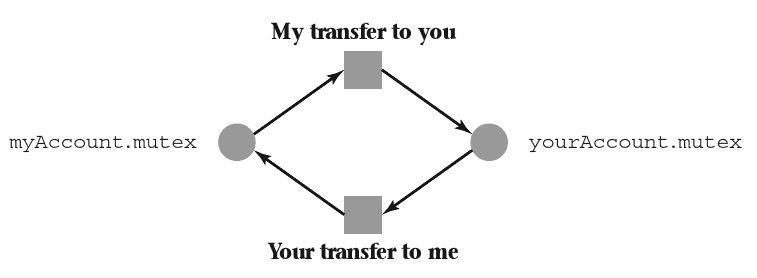4.7 Deadlocks
Concurrency
- Addresses problems of responsiveness and throughput
- Creates problems with races
- Races can be resolved using synchronization patterns
What problems can be caused by synchronization?
Example
Analysis
- Mutexes prevent race conditions
- Transfers will generally work correctly
- What if two accounts transfer to one another concurrently?
Deadlock
- Each thread locks the first mutex and waits for the second
- They now have a circular dependency and will never progress or unlock their mutex
Deadlock conditions
- Threads hold resources exclusively
- Threads hold some resources while waiting for others
- Resources cannot be removed from threads by force
- Threads wait in a circular chain

Addressing Deadlocks
- Detection and mitigation
- Prevention
Detection
- OS stores additional information about mutexes
- Track which thread holds a mutex
- Record which mutex a thread is waiting for
- Use this graph to periodically check for cycles (deadlocks)

Breaking the Deadlock
- A thread can be rolled back to before it attempted the offending lock
- Most systems don’t support rolling back threads
- Killing a thread is the typical solution
Immediate detection
- If we detect deadlock conditions when the last lock in the cycle is attempted, we can notify applications and they can choose to take appropriate action
Prevention Through Resource Ordering
- Requires resources to have global IDs
- When locking resources, lock them in order by ID
Example
Linux Scheduler Example
4.8 Interaction of Synchronization and Scheduling
Synchronization and Scheduling
- Scheduler determines which thread to run
- Synchronization actions performed by running threads determine which other threads are runnable
Priority Inversion
- Causes lower priority threads to be favored over higher priority threads
- Can occur when threads of different priorities share a mutex
Short-term example
- High priority thread waits on I/O
- Low priority runs and acquires mutex
- I/O completes an the high priority thread preempts the other
- High priority thread can’t acquire mutex
- Low priority thread resumes
Short term issues
- Generally not a significant problem
- Concurrent algorithms should be designed to only briefly hold a mutex
- High priority thread will resume promptly
Problematic Example
- High and medium threads both wait on I/O
- Low priority thread runs and acquires mutex
- All I/O completes and the high priority thread preempts the others
- The high priority thread cannot acquire the mutex and waits
- The medium priority thread runs and the low priority thread is unable to give up the mutex
Possible Solution
- Boost priority of lower priority threads that haven’t run much (e.g. decay usage scheduler)
- Creates problems on real-time systems where fixed priorities are desired
Priority Inheritance
- A lower priority thread borrows the higher priority of a thread that is waiting on it
- Similar ideas can be applied to other schedulers
Convoy Phenomenon
- A popular mutex may constantly be contested among a number of threads
- This creates a “convoy” of threads in the waiting queue
Convoy Issues
- Increased context switching due to most lock operations requiring a context switch
- Decreased throughput due to increase context switching
- Breakdown of scheduler prioritization as many threads are not runnable
- Mutex wait queue manages scheduling in practice
Solution
Integrate the mutex wait queue with the scheduler and avoid simple FIFO behavior
Allow a high-priority thread to relock a mutex it gives up even if other threads are waiting on it
4.10 Security and Synchronization
Policy vs Practice
- Some security flaws are due to improper policies implemented correctly
- Other flaws may be due to correct policies with buggy implementations
Synchronization Bugs
- Concurrency is hard, so programmers are likely to introduce bugs
- Race conditions are hard to test for, as the system will usually perform correctly
- Crackers may be able to induce race conditions more frequently than would naturally occur
- Race conditions can allow “impossible” situations and break through defenses
Time of check to time of use
- Class of bugs
- Involve checking for some condition and then using it in a concurrent system
- If the value changes between these points, security assumptions can be violated